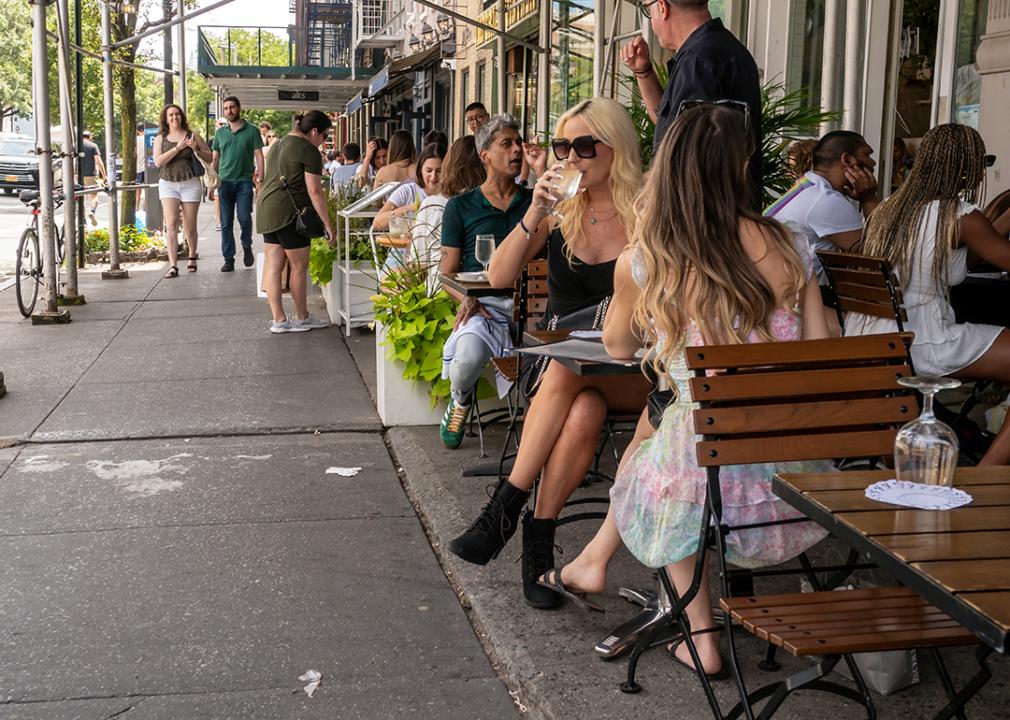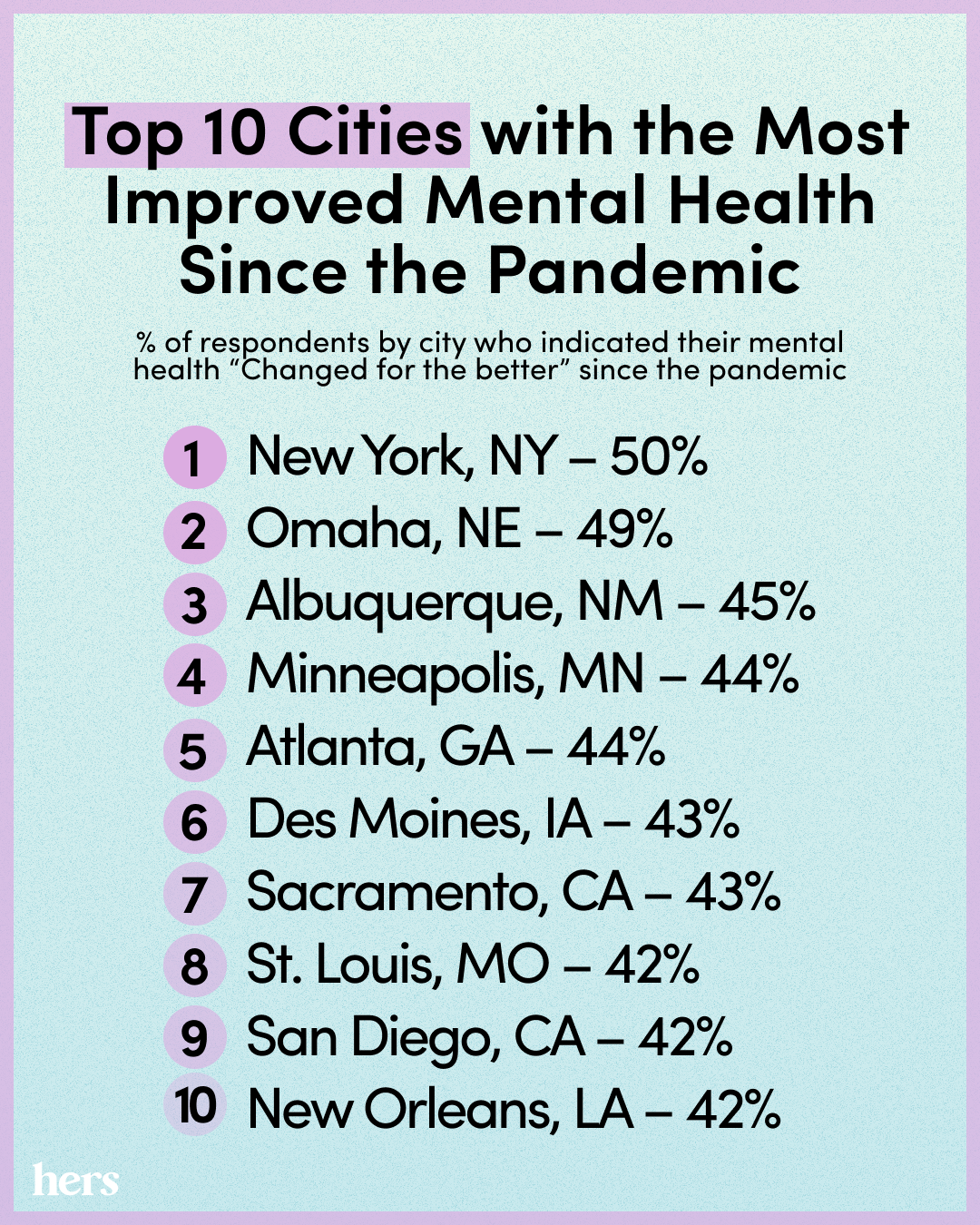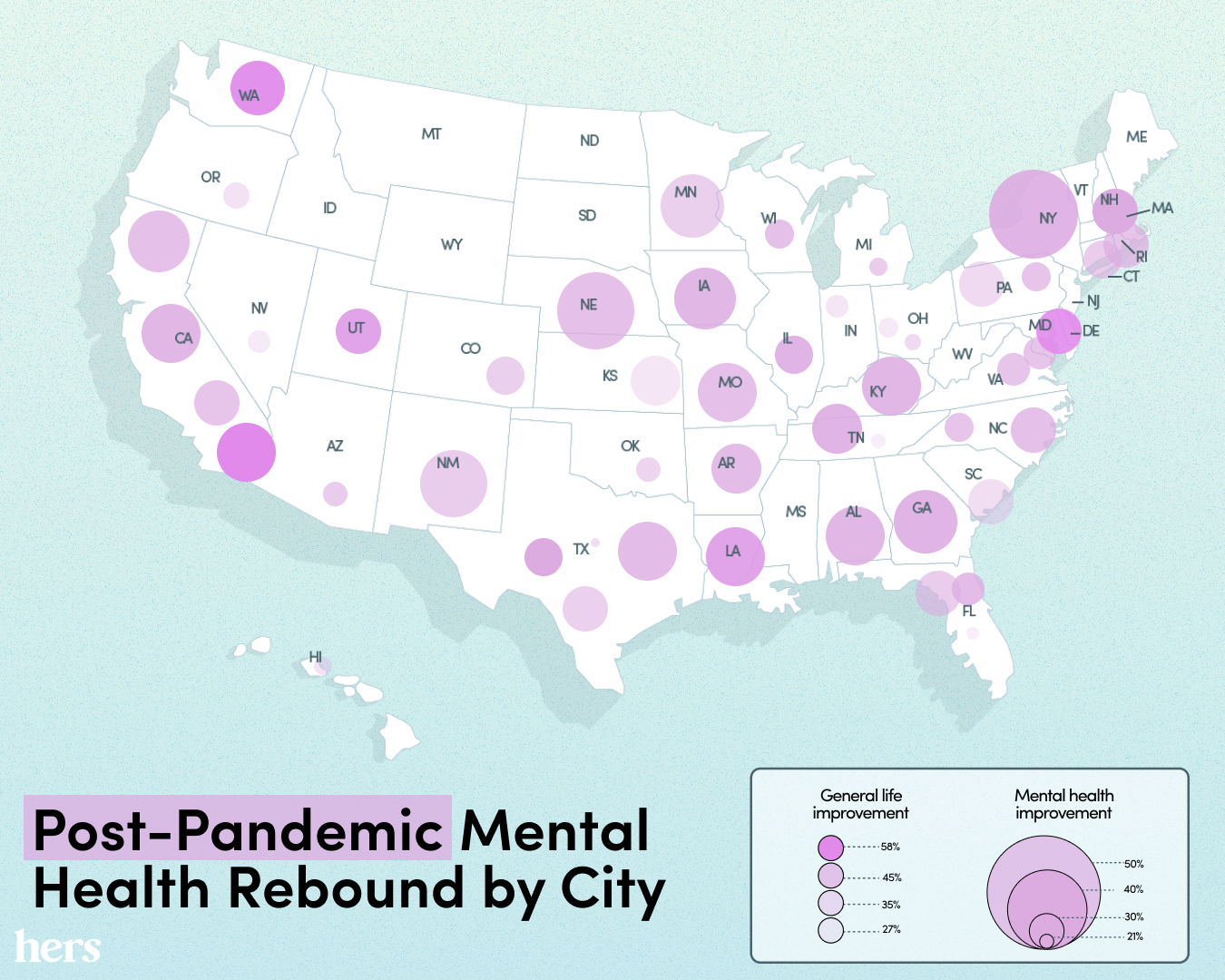NYC makes America's biggest mental health rebound post-pandemic, see how other cities stack up—2024 study

rblfmr // Shutterstock
NYC makes America’s biggest mental health rebound post-pandemic, see how other cities stack up—2024 study
Diners during the day in a lane in New York City enjoying some alfresco dining.
New York City residents are feeling happy and healthy post-pandemic, according to a study conducted by Hims & Hers. New Yorkers reported the biggest positive gains in mental health since having to shelter in place during COVID-19. Half of surveyed New Yorkers (50%) say their mental health has “changed for the better” since the pandemic. This compares with just 38% of Americans between the ages of 18 and 65 overall who reported the same.
Backing up a better New York state of mind: 70% of surveyed New Yorkers graded their current mental health as an A+ (39%) or an A (31%) as compared to 59% of Americans, only one-quarter (25%) of whom gave their mental health top marks (A+).
Top Cities With the Most Improvements in Mental Health Since the Pandemic
Following up New York City, Hims & Hers found that residents in other surveyed cities reported significant improvements in mental health since the pandemic: Omaha, NE (49%); Albuquerque, NM (45%); Minneapolis, MN (44%); Atlanta, GA (44%); and Des Moines, IA (43%).
![]()

ㅤ
Residents of Some Cities Reported Less Improvement
Top 10 Cities with the Most Improved Mental Health Since the Pandemic
Not all cities fared as well. Only 21% of residents surveyed in San Antonio reported that their mental health changed for the better since lockdown, and Tampa, FL; Nashville, TN; Columbus, OH; and Detroit, MI rounded out the bottom of the list (see below for full city rankings).
New York City by the Numbers: A Closer Look at the Top City With Post-pandemic Mental Health Improvements
For New Yorkers who were surveyed, improved mental wellness was accompanied by several significant upticks in their health and life overall, suggesting a positive correlation between mental wellness and life satisfaction. Specifically:
- 54% say their priorities are more in-check vs. 39% of Americans overall
- 46% say their physical health is better vs. 35% of Americans overall
- 44% say their love life has seen a boost vs. 35% of Americans overall
Mental health isn’t just about how people feel emotionally. It’s also connected to their physical appearance and self-confidence, their personal relationships and sexual satisfaction, and how they perform at work and school.
Surveyed New Yorkers are also reporting more improvements in their physical appearance. 45% say their body image has improved since the start of the pandemic and 40% say they look better. This compares with 36% and 35% of Americans, respectively.
New Yorkers’ sex lives have seen less of an improvement than other cities, however, with only 32% of surveyed New Yorkers saying sex is better than before the pandemic, compared to 34% of the country. The New Yorkers surveyed by Hims & Hers also reported that their job satisfaction pre- and post-pandemic was about the same as the rest of the country.
Mental Health by Demographic: The Generations, Genders, and Other Groups With the Biggest Post-pandemic Mental Health Improvements
Beyond mental health improvements by metropolitan areas, there were notable differences in post-pandemic mental health by demographic. Let’s take a look at surveyed respondents by other demographics who indicated their mental health “changed for the better” since the pandemic.
Specifically:
- Generation Z saw the biggest improvement in mental health post-pandemic. 44% of Gen Zs said their mental health changed for the better since the start of the pandemic. (This contrasts previous research that found Gen Z self-reported more mental health negative outcomes compared to other generations.) 42% of Millennials said their mental health had improved post-pandemic, but only 28% of Gen Xers and Baby Boomers indicated improvement.
- Men saw more mental health improvements post-pandemic than women, and dads saw more improvement than moms. 42% of men reported that their mental health had changed for the better since the pandemic vs. 34% of women, and 46% of dads said the same vs. just 36% of moms.
- LGBTQ+ respondents and People of Color (POC) both report their mental health is better as compared to their non-LGBTQ+ and non-POC counterparts. 44% of LGBTQ+ respondents say their mental health has improved vs. 37% of non-LGBTQ+ respondents; and 41% of POC respondents say they’ve seen improvements vs. 33% of non-POC respondents.
- Married couples saw a bigger lift in mental health than singles or non-married couples in monogamous relationships. 41% of married respondents said their mental health had changed for the better as compared to 36% of both singles and couples in monogamous relationships.
- Millennial men fared the best. 47% of Millennial men said their mental health has changed for the better as compared to 35% of Millennial women and 38% of Americans overall.
- Gen X and Boomer women reported the least improvement in their mental health. Only 26% of women 45+ said their mental health had improved post-pandemic as compared to 38% of the total American population.

ㅤ
Cities With the Most Improved Mental Health Since the Pandemic
Heatmap of Post-Pandemic Mental Health Rebound by City.
Based on the percentage of respondents by city who indicated their mental health “Changed for the better” since the pandemic.
- New York, NY – 50%
- Omaha, NE – 49%
- Albuquerque, NM – 45%
- Minneapolis, MN – 44%
- Atlanta, GA – 44%
- Des Moines, IA – 43%
- Sacramento, CA – 43%
- St. Louis, MO – 42%
- San Diego, CA – 42%
- New Orleans, LA – 42%
- Birmingham, AL – 42%
- San Francisco, CA – 42%
- Pittsburg, PA – 42%
- Houston, TX – 42%
- Louisville, KY – 42%
- Seattle, WA – 41%
- Memphis, TN – 40%
- Little Rock, AS – 40%
- Kansas City, KS – 40%
- Miami, FL – 39%
- Greenville, SC – 39%
- Boston, MA – 39%
- Philadelphia, PA – 39%
- Providence, RI – 39%
- Baltimore, MD – 39%
- Dallas, TX – 39%
- Salt Lake City, UT – 39%
- Charlotte, NC – 39%
- Los Angeles, CA – 39%
- Austin, TX – 38%
- New Haven, CT – 38%
- Chicago, IL – 38%
- Denver, CO – 38%
- Milwaukee, WI – 37%
- Norfolk, VA – 37%
- Orlando, FL – 37%
- Washington, DC – 37%
- Raleigh, NC – 36%
- Portland, OR – 36%
- Oklahoma City, OK – 35%
- Phoenix, AZ – 35%
- Las Vegas, NV – 34%
- Indianapolis, IN – 34%
- Cleveland, OH – 32%
- Honolulu, HI – 29%
- Detroit, MI – 29%
- Columbus, OH – 28%
- Nashville, TN – 26%
- Tampa, FL – 25%
- San Antonio, TX – 21%
Cities With the Most General Life Improvements Since the Pandemic
Based on the percentage of respondents by city who indicated their life in general “Changed for the better” since the pandemic.
- San Diego, CA – 58%
- Baltimore, MD – 55%
- Seattle, WA – 53%
- New Orleans, LA – 51%
- Salt Lake City, UT – 51%
- Austin, TX – 50%
- Boston, MA – 50%
- Chicago, IL – 49%
- Memphis, TN – 47%
- New York, NY – 47%
- Atlanta, GA – 47%
- San Francisco, CA – 46%
- Des Moines, IA – 46%
- Louisville, KY – 46%
- Birmingham, AL – 45%
- Little Rock, AR – 44%
- Orlando, FL – 44%
- Houston, TX – 44%
- Omaha, NE – 43%
- Milwaukee, WI – 43%
- Sacramento, CA – 43%
- St. Louis, MO – 43%
- Charlotte, NC – 43%
- Norfolk, VA – 42%
- Raleigh, NC – 42%
- Providence, RI – 42%
- Los Angeles, CA – 42%
- Philadelphia, PA – 42%
- Washington, DC – 42%
- Albuquerque, NM – 41%
- Miami, FL – 41%
- Detroit, MI – 41%
- Phoenix, AZ – 41%
- New Haven, CT – 41%
- Minneapolis, MN – 40%
- Denver, CO – 40%
- Dallas, TX – 39%
- Oklahoma City, OK – 38%
- Columbus, OH – 37%
- Pittsburg, PA – 36%
- Greenville, SC – 35%
- San Antonio, TX – 35%
- Honolulu, HI – 34%
- Portland, OR – 33%
- Kansas City, KS – 32%
- Indianapolis, IN – 32%
- Las Vegas, NV – 31%
- Cleveland, OH – 30%
- Tampa, FL – 30%
- Nashville, TN – 27%
Data & Methodology
This study is based on a 5,504-person online survey, which included 5,000 18-to-65-year-old respondents in the top 50 metropolitan areas (100 respondents per city) and a nationally representative sample of 504 18-to-65-year-old respondents to contextualize results. The study was fielded in May 2024.
Findings were analyzed by more than 100 demographic and psychographic cuts, including city, region, gender (when we refer to “women” and “men,” we include all people who self-identify as such), age, race and ethnicity, relationship status, parenting status, sexual orientation (heterosexual, bisexual, gay, lesbian, pansexual, asexual, queer, etc.), and political affiliation, among other areas of interest.
Metropolitan populations were determined by 2022 U.S. Census data. In order to represent as many states as possible within the study, 5 cities that did not fall in the top 50 metropolitan locations were selected in place of cities in states already represented. Cities added to the study included New Orleans, LA (51), Providence, RI (53), Little Rock, AR (59), Honolulu, HI (68), and Omaha, NE (71). Cities replaced in the study included West Palm Beach, FL (39), Jacksonville, FL (41), Grand Rapids, MI (42), Harrisburg, PA (44), and Greensboro, NC (45).
In cases of ties, city ranking was determined by the city that had the highest percentage of respondents who said their mental health or life in general had “stayed the same” and the lowest percentage of respondents who said their mental health or life in general “changed for the worse.”
All data in this study are from this source, unless otherwise noted. Independent research firm, Culture Co-op, conducted and analyzed research and findings.
Tips for Improving Your Mental Health
Wherever you live, there are research-backed things you can do to improve your mental health. Here are a few tips to help you get started.
- Practice self-care. Things like journaling, meditating, getting enough sleep, and spending time with friends and family have all demonstrated positive impacts on mental health in studies and can help quiet your mind.
- Create healthy lifestyle habits. Research shows that limiting your alcohol intake, eating a healthy diet, and exercising regularly can have strong positive impacts on your mental health.
- Explore treatment options like therapy and medication, which can be highly effective for treating anxiety and depression.
This story was produced by Hers and reviewed and distributed by Stacker Media.
